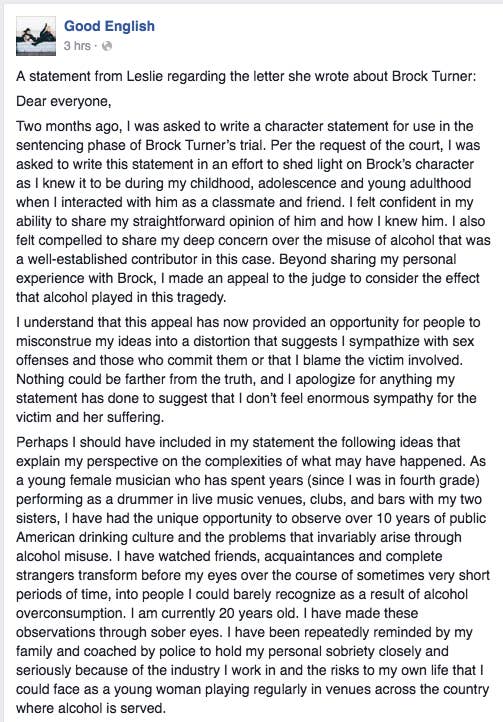A friend of Brock Turner, the former Stanford swimmer convicted of sexual assault, who penned a letter in his defense retracted her statements in a now-deleted Facebook post.

Turner, 20, was convicted of three counts of sexually assaulting an unconscious woman behind a dumpster on the Stanford campus after a fraternity party in 2015.
Turner had faced a maximum 14 years in state prison, but last week was given the reduced sentence of six months in county jail and probation.
In a character statement — which are typical in the sentencing phase of trials — Leslie Rasmussen defended Turner, blaming accusations of campus rape on political correctness and chalking it up as a "huge misunderstanding."
"I don't think it's fair to base the fate of the next ten + years of his life on the decision of a girl who doesn't remember anything but the amount she drank to press charges against him," she wrote. "I am not blaming her directly for this, because that isn't right. But where do we draw the line and stop worrying about being politically correct every second of the day and see that rape on campuses isn't always because people are rapists."
Rasmussen went on to say that the Turner case was not rape because it "is completely different from a woman getting kidnapped and raped as she is walking to her car in a parking lot."
But on Wednesday, Rasmussen posted a statement on her band's Facebook page retracting her early comments. The post has since been deleted.

"I know that Brock Turner was tried and rightfully convicted of sexual assault," she posted. "I realize that this crime caused enormous pain for the victim. I don't condone, support, or sympathize with the offense or the offender. I was asked by a court in California to provide a character statement as a standard and necessary part of the sentencing process.
"I believe that Brock's character was seriously affected by the alcohol he consumed, and I felt that the court needed to consider this issue during their sentencing deliberations."
The woman's band, Good English, saw their gigs canceled following Rasmussen's statements in support of Turner.
Four Brooklyn bars, which were set to host the band, have canceled shows, according to Gothamist.

Read Rasmussen's full statement regarding the letter she wrote about Turner here:
Dear everyone,
Two months ago, I was asked to write a character statement for use in the sentencing phase of Brock Turner's trial. Per the request of the court, I was asked to write this statement in an effort to shed light on Brock's character as I knew it to be during my childhood, adolescence and young adulthood when I interacted with him as a classmate and friend. I felt confident in my ability to share my straightforward opinion of him and how I knew him. I also felt compelled to share my deep concern over the misuse of alcohol that was a well-established contributor in this case. Beyond sharing my personal experience with Brock, I made an appeal to the judge to consider the effect that alcohol played in this tragedy.
I understand that this appeal has now provided an opportunity for people to misconstrue my ideas into a distortion that suggests I sympathize with sex offenses and those who commit them or that I blame the victim involved. Nothing could be farther from the truth, and I apologize for anything my statement has done to suggest that I don't feel enormous sympathy for the victim and her suffering.
Perhaps I should have included in my statement the following ideas that explain my perspective on the complexities of what may have happened. As a young female musician who has spent years (since I was in fourth grade) performing as a drummer in live music venues, clubs, and bars with my two sisters, I have had the unique opportunity to observe over 10 years of public American drinking culture and the problems that invariably arise through alcohol misuse. I have watched friends, acquaintances and complete strangers transform before my eyes over the course of sometimes very short periods of time, into people I could barely recognize as a result of alcohol overconsumption. I am currently 20 years old. I have made these observations through sober eyes. I have been repeatedly reminded by my family and coached by police to hold my personal sobriety closely and seriously because of the industry I work in and the risks to my own life that I could face as a young woman playing regularly in venues across the country where alcohol is served.
Additionally, I have grown up and currently reside in a university town that is affected every year by the tragic consequences resulting from undergraduate students' excessive enthusiasm for binge drinking. Student arrests, violence, injuries, and sexual assaults occur with some regularity, and I have often wondered why this culture continues to thrive seemingly unquestioned and unchecked.
There is nothing more sad than the unnecessary, destructive and enormous toll that overuse, misuse and abuse of alcohol and drugs play in people's lives, and I don't think my effort to point this out in confidence to a judge while commenting on Brock Turner's character, as the sober person I knew him to be, was an irresponsible or reckless decision. Unfortunately, due to the overzealous nature of social media and the lack of confidence and privacy in which my letter to the judge was held, I am now thrust into the public eye to defend my position on this matter in the court of public opinion. Now, my choices to defer college to write and play music, to finally introduce 10 years of hard work to a national audience while working consistently and intentionally on my own personal and professional integrity, has led to an uproar of judgement and hatred unleashed on me, my band and my family.
I know that Brock Turner was tried and rightfully convicted of sexual assault. I realize that this crime caused enormous pain for the victim. I don't condone, support, or sympathize with the offense or the offender. I was asked by a court in California to provide a character statement as a standard and necessary part of the sentencing process. I believe that Brock's character was seriously affected by the alcohol he consumed, and I felt that the court needed to consider this issue during their sentencing deliberations.
Sincerely,
Leslie Rasmussen
